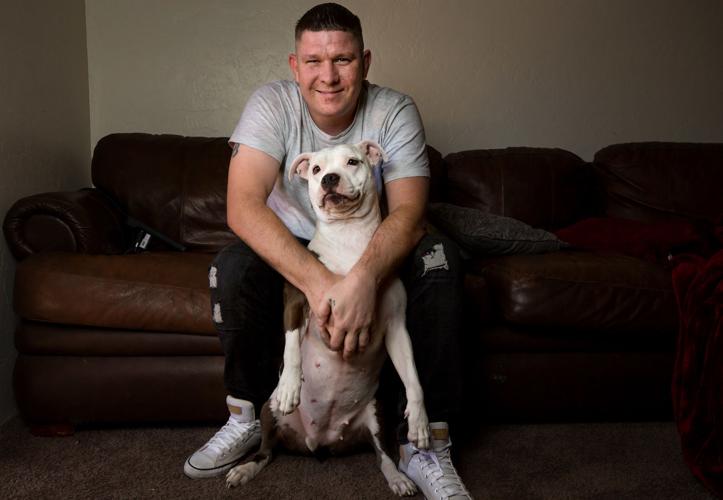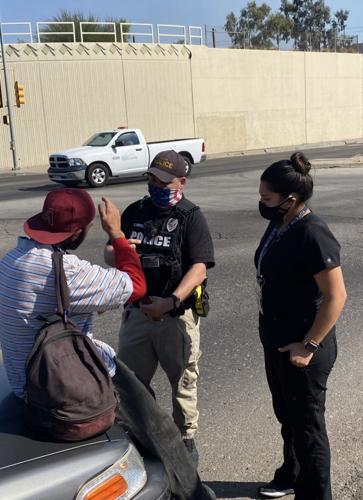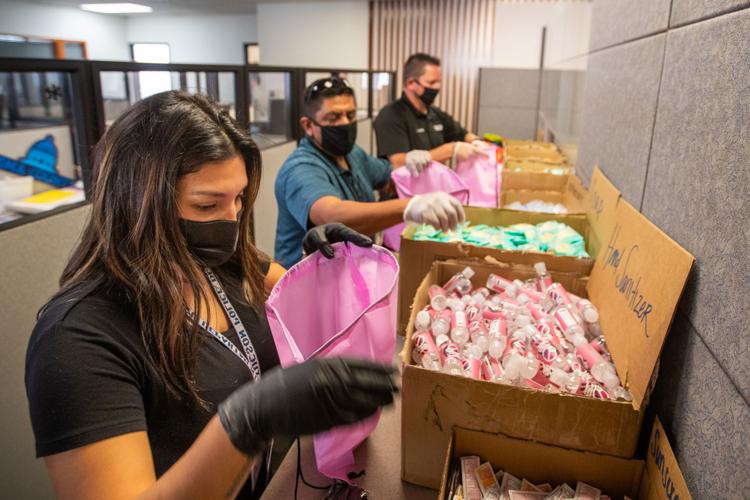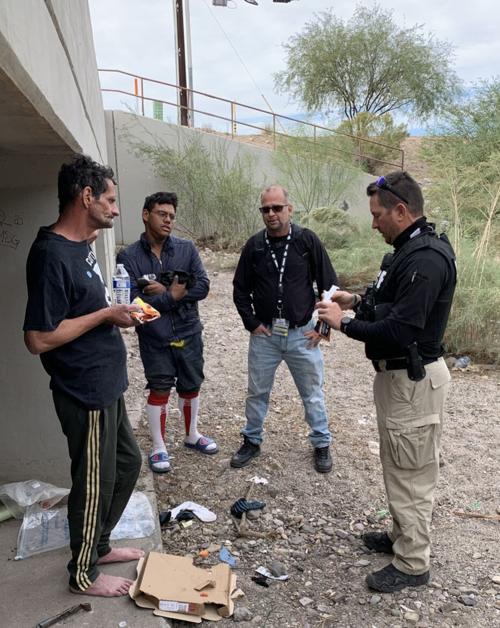Phillip Bernard was sitting in a Pima County jail cell in August 2019 believing his life was over.
With a string of arrests and two prior theft convictions already on his record, Bernard had just been caught after being on the lam for a few months.
Now 32, he’d been struggling with drug addiction that started when he was 14 years old.
“I did a lot of things I’m not very proud of,” Bernard said. “I put my family through a lot.”
Despite help through COPE Community Services, without a stable place to live, a job or sense of purpose, it didn’t take long before he was back to his old ways. Yet as he sat on the concrete booking benches at the Pima County jail, Bernard knew something had to give.
“I made a pact with God that if he helped me through it, I’d never turn my back on him again,” Bernard said. “Then here comes Cindy.”
Cindy Buchler offered Bernard a way out.
“She was asking me where I was planning on going and I said, ‘I don’t have any place to go. I’m done with this but I don’t have a place to go,’” Bernard said.Buchler works for Pima County’s Pretrial Services Division. She referred Bernard to the Housing First program, which is for people who are homeless, have a substance abuse or mental health issue, and have been booked into jail at least twice in the past 12 months.
The program was launched a few months before Bernard’s arrest in May 2019. It’s a collaboration between the county’s Criminal Justice Reform Unit and Old Pueblo Community Services. In addition to overseeing day-to-day operations, OPCS also handles mental health and medical services. The city of Tucson provides housing vouchers for Bernard and other residents.
By October 2019, Bernard had received the keys to his new apartment and by extension, a new life.
“This time around, it’s been quite different for me,” Bernard said. “It was a godsend. I don’t know if I would be alive today or in prison if it wasn’t for the support of Pretrial Services and my public defender and April at Old Pueblo.”
“It was the right thing to do”
Since moving into his apartment, Bernard has been able to make amends with his family, spend time with his children and take serious steps toward a better future.
It hasn’t all been easy.

After getting out of jail, Phillip Bernard got assistance from Pima County’s Housing First program and now lives in an apartment with his dog, Xena. Knowing he has a roof over his head has helped him stay sober, he says.
In March, Bernard started a new job at P.F. Chang’s, thanks to a car he was able to buy with help from his mother. A few days after he began, Tucson Mayor Regina Romero ordered the shutdown of “nonessential” services within the city limits to mitigate the spread of the coronavirus.
The restaurant eventually reopened. But by then Bernard’s car had broken down and he lost his job.
Unlike many other unemployed Tucsonans, Bernard doesn’t have to worry about losing his home, thanks to Housing First.
Knowing he has a roof over his head has helped Bernard stay sober.
“I haven’t even had the thought of using through all these struggles,” Bernard said. “The old me would have wanted to give up and get high, but this time around I didn’t give up. I said I’d keep fighting through it.”
Bernard is one of thousands of people who have received help through programs within the county’s Criminal Justice Reform Unit, including Housing First, the Jail Population Review Committee, U-MATTER and others.
Officials with the CJRU say Bernard is one of many success stories in their ongoing effort to reduce the jail population for the past several years, including more recently to help reduce the spread of the coronavirus.
All of the 467 people released from custody through the Jail Population Review Committee as of Dec. 1 received assistance and services to help them stay out of jail and to address their underlying issues.
The committee, which was formed in 2019, assesses the custody status of inmates and identifies safe and effective release conditions while balancing public-safety concerns. The group meets every week and does its best to help make sure those who are released have their basic needs met, said Wendy Petersen, assistant county administrator for justice and law enforcement.

Wendy Petersen
“We make valiant efforts to try to make sure people are housed,” Petersen said. “If they don’t have housing through Housing First, they get wraparound services through other service providers that are members of the meeting.”
Wraparound services can include transportation assistance, help in finding employment or enrolling in government benefits, peer mentoring, court supervision and other evidence-based interventions.
“whole person” aspect
The meetings are run by Kate Vesely, the director of justice reform initiatives, who signed onto the position in February. Vesely was previously director of specialty court initiatives at the Pima County Attorney’s Office.
The video conference meetings are a collaborative effort to balance public safety and individual rights. Prosecutors and public defenders are the main decisions makers, Vesely said.
The committee receives information from treatment providers, law enforcement, community service officers, homeless outreach advocates and anyone else who may have information on the individual up for review before making its decision.
“It’s the ‘whole person’ aspect that we try really hard to address,” Vesely said.

Vesely
The committee is made up of employees from the county, Superior Court, the city and agencies that include residential, addiction and mental health services.
“We take great strides to represent community safety in our conversations,” Vesely said.
Petersen said housing and peer support have been game-changers for a number of people who have come through the program.
“I cannot stress the value of having a person to say, ‘I made it; you can make it too,” Petersen said. “I think the results speak for themselves.”
From a data perspective, the program is still “really young,” Petersen said, having not even hit the two-year mark.
But data provided by the county show that the 467 people released through the committee have saved the county 21,479 days in jail. That equates to more than $2 million in savings.
Of those 467 people, 150 said they were homeless and 19 said they were veterans.
“We have promising results about how many jail days we’ve saved, but we also have demonstrated the recidivism rate is much lower and represents a very low portion of that community.”
“We’re not going back to the bad old days”
In early March, when County Administrator Chuck Huckelberry asked the CJRU to step up their efforts, the task of finding housing fell upon Vesely.
“It was intense,” Vesely said of the several-week push in which she was able to find housing for 50 people. “We didn’t want them in hospitals and shelters, and we definitely didn’t want them out in the elements.”
Petersen called the work that went into housing all 50 people a “remarkable effort” by Vesely and others involved.
“Folks were scrambling to take care of this,” Petersen said. “It was the right thing to do, the moral thing to do. And from a health standpoint, it was absolutely mandatory that we do this.”
Petersen said that regardless of the pandemic, now is the time to focus on issues like reentry and keeping people out of jail to begin with.
“It’s a national trend. Chuck (Huckelberry) says whenever we worry about the money, ‘We’re never going back, we’re just going forward,’” Petersen said. “We’re not going back to the bad old days.”
In addition to being the right thing to do, jail releases can save the community a tremendous amount of money when done correctly, Vesely said.
“Correctly” means implementing a thorough decision-making process, and receiving community input and feedback from public-safety representatives and treatment providers.
“Why not release them with this level of support and intervention?” Vesely asked. “It makes the community more safe than if they’d been released on their own accord.”

Staffers with the county’s Criminal Justice Reform Unit, CODAC peer navigators and the Police Department’s Substance Use Resource Team assemble bags containing hand sanitizer, masks, toiletries, socks and Narcan for people getting out of jail.
“Release bags” contain Narcan
In addition to support, those released from custody under the program get “release bags” to help them reintegrate to life out of jail, a brainchild of Mayra Ramos, program coordinator for the county’s United Medication Assisted Treatment Targeted Engagement Response, or U-MATTER, program.
U-MATTER was established in October 2018 as a partnership between Pima County, the Tucson Police Department, local service providers and the University of Arizona’s Southwest Institute for Research on Women. The grant-funded program focuses on medication-assisted treatment for people dealing with opioid abuse.
The program is an extension of TPD's deflection program, which was started in July 2018 after Assistant Chief Kevin Hall learned about similar work being done on the East Coast. U-MATTER took the program a step further, pairing Codac drug counselors, called peer navigators, with TPD’s Mental Health Support Team to respond to overdoses and mental-health calls. The initiative, along with Housing First, is one of several started as part of Pima County's involvement in the MacArthur Foundation's Safety and Justice Challenge, a nationwide initiative to safely reduce the number of people in jail. The county's first director of justice reform initiatives, Terrance Cheung, oversaw the implementation of both U-MATTER and Housing First, before transitioning into a job with Pima County Superior Court.
Pima County’s Public Defense Services saw the idea for the release bags being used elsewhere and brought the idea to the CJRU, who tasked Ramos with implementing the program in Tucson.
Ramos worked with U-MATTER’s peer support specialists to come up with what would go into the bags.

Mayra Ramos
The bags include about 20 items, as well as printed information about the coronavirus and how to access community resources. Items include masks, hand sanitizer, socks, toiletries and Narcan, which is used to reverse an opioid overdose.
“Initially we did not include Narcan. But we know individuals being released from jail are at higher risk rates for opiate use and related deaths,” Ramos said, adding that the Narcan comes through the county’s partnership with Sonoran Prevention Works. “That’s something that is going to be very meaningful and impactful as we continue to see advisories in community regarding opioid related deaths.”
The bags are given to people who are released through the JPRC, have been deflected to medication-assisted treatment through TPD, are part of the U-MATTER program or are contacted during follow-up outreach after experiencing an opioid overdose.
Initial funding paid for 300 bags, which Ramos hopes to go through “rather quickly” and begin looking for funding for more.
Since U-MATTER’s inception, more than 1,550 people have been kept out of jail.
“On the cost savings aspect, that is huge to both the city of Tucson and Pima County, but also in regards to the number of individuals we’ve been able to connect to services,” Ramos said.
Sept. 30 marked the end of Year 2 of the three-year grant period, with Ramos saying they’re looking to sustain the program past 2021.
The numbers show successes. Upon intake, 20% of people surveyed reported drug use in the past 30 days. During three-month follow-up visits, the number of people reporting drug use in the previous 30 days dropped to 9.2% and at six months, the number dropped to 4.1%.

Through the U-MATTER program, police officers and local peer support specialists have kept more than 1,550 people out of jail since the program’s inception in October 2018.
“This speaks volumes about the high-quality evidence-based clinical services CODAC provides, but also kudos and props need to go out to our peer support specialists in the field,” Ramos said.
“On a daily basis we still try to break the stigma of substance use and medication-assisted treatment,” Ramos said. “That is a high priority among us.”
Helping newcomers is a “Reprieve” to him
While Bernard is still looking to find work, he’s also getting ready to go back to school. He plans to start at Pima Community College in January, taking classes toward earning his GED while also taking classes to later transfer to a four-year school.
He’s aiming for law school and says the judge gave him a way to have his convictions set aside or expunged. It’s an offer he says is good up to three years after his convictions.
He’s also sponsoring people through Narcotics Anonymous and Alcoholics Anonymous, and passing along what he learned through COPE and his own experiences.
“We can only keep what we have by giving it away,” Bernard said. “Helping newcomers out every chance I get it is a daily reprieve for me.” Bernard admits he has a long road ahead of him, but says life itself is a work in progress and nothing happens overnight.
“This has all really been a life-changing experience and it wouldn’t have ever been possible without Cindy and Pretrial Services and everything that had to come together to save somebody like me,” he said.









